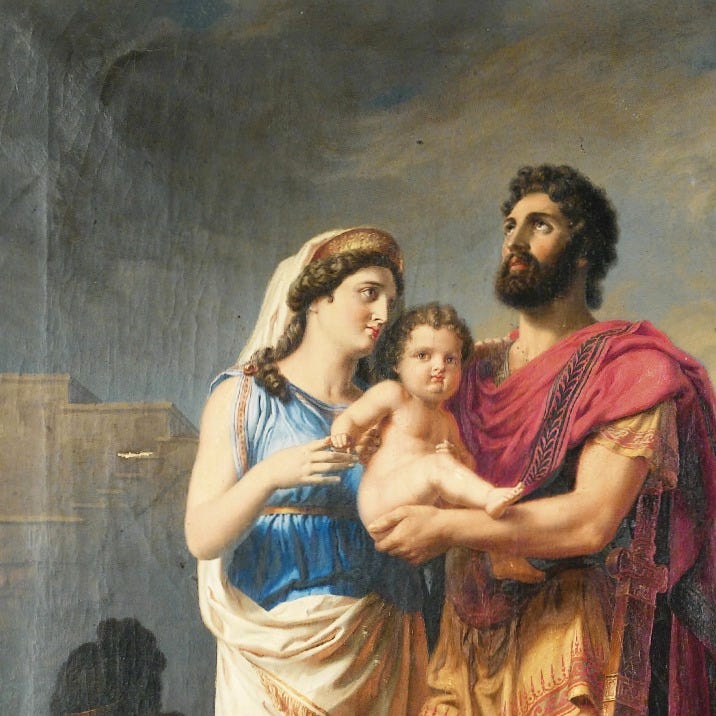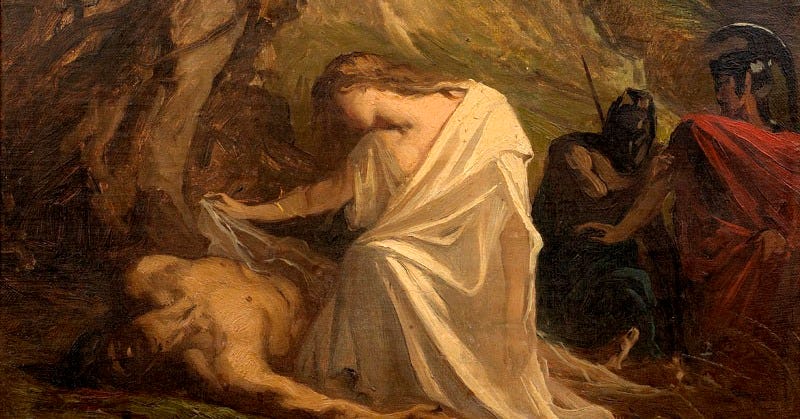Recovering a Politics of Gratitude
Rethinking our obsession with rights
The two most influential persons in the West, Socrates and Jesus, were both executed for their alleged impiety.
What then is piety? What would be so important to merit death?
Piety is not reducible to some naive, unthinking religious devotion—rather, piety is a cosmic force, one that structures man’s relations and arranges his allegiances.
Most of all, piety cultivates a politics of gratitude.
It is a lesson as old as Homer and reiterated by such ancients as Aeschylus, Sophocles, Plato, and Cicero, which Christians adopted, as seen in the writings of St. Thomas Aquinas.
Yet, this politics of gratitude, your inheritance in the West, fell under the corrosive power of a new, modern political imagination—one focused not on gratitude but on autonomy, licentiousness, and most of all rights, i.e., what you are owed. The sinews of gratitude that held the Western political order intact unraveled.
Today, a country may give every opportunity and blessing to a citizen, and that citizen seethe with an ungrateful heart that only has an insatiable desire for more.
If you are open, a whole new political imagination awaits—one that is rooted in Greek and Christian thought.
Reminder: this is a teaser of our members-only deep dives.
To support our mission and get our premium content every week, upgrade for a few dollars per month. You’ll get:
New, full-length articles every Tuesday and Friday
The entire archive of members-only essays
Access to our paid subscriber chat room
The Ancient Lesson on Piety
Piety is not what you think. Many may see it as “religious expression” or even pejoratively as a simple, unthinking belief in the divine—but what if piety was about cosmic order? True piety is rooted in gratitude. The pious man understands that he owes an unpayable debt to his family, his polis, and his God. He has been nourished by these goods long before he could ever contribute to them. Piety cultivates in the heart a gratitude that longs to give back to that which has cared for it; thus, the pious man honors his parents, he contributes to his polis, and he serves his God.
The virtue of piety reveals to man the contours by which he governs his relations, as piety exists in a hierarchal order from lowest to highest: family, polis, and divine. It structures his reality, arranges his allegiances, and creates in him a politics of gratitude—a political imagination ordered by a duty to give back in thanksgiving for what has been received. And piety as a political and cosmic force is not a new concept, as it runs unbroken in the West from Homer to St. Thomas Aquinas.
Piety is at the heart of the Western political imagination.
Political Piety as Your Western Heritage
Piety as a civilizing force that kneads within the heart a gratitude toward the family, polis, and divine is your Western inheritance. It is present in Homer, Aeschylus, Aristophanes, Plato, Cicero, and adopted into Christianity by thinkers like St. Thomas Aquinas. While not exhaustive, a quick sketch of piety in a few major Western thinkers can help illuminate the beauty of true pious thought—and the violence and disorder impiety can bring.
The Iliad and the Odyssey, as Socrates tells us, are about justice, and the virtue of piety, though nascent as a philosophical concept, animates much of the motion of the two texts. In the Iliad, Hector, Prince of Troy, is often revered as a pious man, as the medieval Christians held him as first of the “nine worthies.” Hector defends his polis against the onslaught of the Achaeans (Greeks) and remains pious toward the gods—despite them condemning Troy to a terrible fate. Several times, Hector will disregard the opinions of his parents or wife for the sake of Troy, showing that piety exists in hierarchy and when conflict arise the higher good must be served.
In the Odyssey, Odysseus’ famous journey home can be seen as one motivated by piety, as Odysseus has the opportunity to become immortal, love a goddess, marry a princess, stay in a utopia, etc., but elects to endure hardship to return to his polis, Ithaca, and to his wife, Penelope. Odysseus, like Hector, is not without fault, but both show a love of one’s own—a love of family, a love of polis, and a love of the divine. It is a love born out of gratitude, and a love that is not easily replaced, even if a utopia is offered for Ithaca or a young princess for Penelope.
When there is conflict between the family, polis, and the divine, it creates a drama in which the pious heart struggles to understand what is good and just. It is this drama that structures many of the Greek tragedies. In Aeschylus’ Oresteia, Orestes avenges his father’s murder, a pious act, by killing his own mother, a seemingly impious act. His actions fracture the divine, as the Furies demand his blood for a heinous act (killing your own mother) but Apollo defends him as a just avenger (killing your father’s murderer). The story ends with Athena holding a trial or, in other words, the divine has to realign the hierarchy of what is truly pious—as piety and justice will always be in harmony. Impiety, however, will bring disorder.
Similarly, Antigone opens with Antigone’s brother laying dead on the battlefield. The king, Creon, says the body should remain unburied, because the gods do not honor traitors. Antigone, however, says the gods demand her brother be buried, as burial is a ritual deserved by all. Antigone is motivated by piety toward family, while Creon is motivated by piety toward the polis—and both believe piety toward the divine supports their position. Though the positions of both characters undergo change, the story of Antigone reveals the political instability and tragedy that can occur when the threefold nature of piety is misaligned.
What is so foreign to the modern political imagination is a piety that gives structure to the relations between family, polis, and gods. Piety, for moderns, is something personal and relative—nothing something communal and objective.
Yet, the two most influential persons in the West, Socrates and Jesus, were both executed for their alleged impiety.
The renewal of your political imagination lies with the lessons of these two figures—and understanding how modern politics eroded a politics of gratitude.





